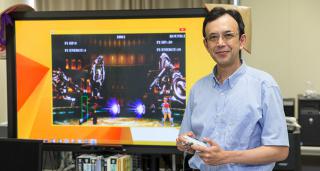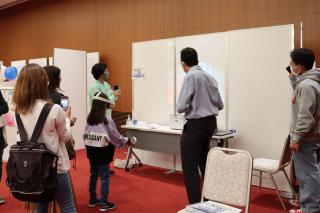-
An Interview with Prof. Ruck Thawonmas (College of Information Science and Engineering) on Utilizing ARC Database Resources in Research on Game AI ※本文は英語です2024年1月26日(金)
Background:
Prof. Ruck Thawonmas, a research member of the Art Research Center (ARC), received his B.Eng. degree in electrical engineering from Chulalongkorn University, Thailand, in 1987, an M.Eng. degree in information science from Ibaraki University in 1990, and a Ph.D. degree in information engineering from Tohoku University in 1994.
He is a Full Professor at the College of Information Science and Engineering, Ritsumeikan University, where he leads the Intelligent Computer Entertainment Laboratory (ICE Lab).Prof. Thawonmas, thank you very much for your time today. Can you tell us how you joined Ritsumeikan University and the Art Research Center (ARC)?
 Prof. Thawonmas: After I finished my Ph.D. at Tohoku University, I worked at several places in Japan. One day, I saw an interview with a non-Japanese professor at Ritsumeikan University. Seeing that the interviewee was a full professor doing well despite being non-Japanese in an international atmosphere environment encouraged me to join the university.
Prof. Thawonmas: After I finished my Ph.D. at Tohoku University, I worked at several places in Japan. One day, I saw an interview with a non-Japanese professor at Ritsumeikan University. Seeing that the interviewee was a full professor doing well despite being non-Japanese in an international atmosphere environment encouraged me to join the university.I joined Ritsumeikan University in 2002 when the university was planning to establish my current college--the College of Information Science and Engineering (CISE).
While my early research focused on data mining, upon joining Ritsumeikan, I decided to slightly change my research area to set myself apart from other professors. I started to look into entertainment computing and computer games, which were not yet well-recognized research areas at that time, either domestically or internationally.
From the beginning of my tenure at Ritsumeikan, I became involved in the ARC's research activities, including the application and subsequent execution of the 21st Century COE (Center for Excellence) Program of the Ministry of Education (MEXT) "Kyoto Art Entertainment Innovation Research." Guess who added the term entertainment there!
As the Head of the Intelligent Computer Entertainment Laboratory (ICE Lab), you have been engaged in research on game AI and intelligent techniques for increasing the entertainment value of computer games. Could you give us some examples of how digital resources of the ARC have been utilized in your research projects?
Prof. Thawonmas: As part of our effort to promote Japanese culture through games, ukiyo-e prints from the ARC Ukiyo-e Portal Database have been incorporated as background images in various projects on game AI.
For example, one of the trends in gaming is the growing presence of individuals who enjoy games as spectators rather than players--yet little research has been conducted on game AI that targets spectators.
To address this issue, we have developed a fighting game for 24/7 video-game live streaming for our research on Procedural Play Generation (PPG)--the auto-generation of content for spectators' enjoyment. (*) We hope that the ukiyo-e images appearing in the background in the game will prompt viewers to take an interest in Japanese cultural heritage.
Concerning our research on games for well-being and serious purposes, we developed an "Audience Participation Game With a Purpose" (APGWAP) called JUSTIN in which we also utilized ARC database resources for the game design. JUSTIN helps us to collect descriptive data of artwork images for visually impaired people who, for example, have limited access to the contents of the ARC Ukiyo-e Portal Database in its current form. In order to facilitate accessibility, text descriptions that are easily converted into speech nowadays are required.
Although the database already contains descriptive data of ukiyo-e prints to some extent, these have mainly been created from an expert point of view as opposed to from the point of view of the general public.
JUSTIN is a game system where players from the general public provide meaningful descriptions for ukiyo-e images on live streaming platforms such as Twitch. Therefore, we can collect large amounts of descriptive data of ukiyo-e images by utilizing human participation, and it proves to be a powerful tool to exploit crowd-sourcing.
(*) The game FightingICE was the official game for a fighting game AI competition at the Conference on Games (previously called Conference on Computational Intelligence and Games) of the Institute of Electrical and Electronics Engineers (IEEE).
 Most recently, you also exhibited a VR game at the Ritsumeikan University Asia Week. Can you tell us more about it?
Most recently, you also exhibited a VR game at the Ritsumeikan University Asia Week. Can you tell us more about it?Prof. Thawonmas: The Asia Week is a festival-like event held annually on the Osaka-Ibaraki Campus to promote international exchange and attended by students and local families. We invited visitors to experience our virtual reality audience participation game ICE Beat developed jointly by not only my lab's students but also intern students from France, a JICA trainee from Mexico, and a visiting Ph.D. student from Italy.
The demonstration of our VR game at Asia Week served as an outreach activity to disseminate our research achievements on VR game design utilizing the database materials of the Art Research Center. Further, the event provided an opportunity to obtain valuable insights for our preliminary user study.
VR games with audience participation provide more enjoyment for players through enhanced immersion and enjoyment for audiences through their ability to participate in the game. In the case of ICE Beat, the audience is able to participate in the game through a cheering interface on a web page accessed from their mobile devices so we can promote social interactivity between players and audiences. VR games also help us to achieve serious goals, such as promoting health and well-being through exercise.
In the 2023 international ranking of universities and other institutions active in technical games research, Ritsumeikan University was ranked 63 thanks to the efforts of your laboratory. Congratulations on this achievement.
Prof. Thawonmas: Thank you very much. This ranking, maintained by one of my colleagues in the US, uses a simple, objective calculation by counting the number of peer-reviewed research papers that have appeared in related conferences and journals in the past ten years.
Ultimately, we strive to maintain Ritsumeikan University in the top 100 of this ranking. The best way to improve the ranking is to increase the number of papers. As part of the Intelligent Computer Entertainment Laboratory, my students work really hard towards contributing to this goal as well.
Talking about your students--as the ARC places great emphasis on fostering young researchers as part of its mission--how do you go about fostering young researchers?
Prof. Thawonmas: Nowadays, I have been involved in volunteering work as a certified University Ambassador with the NVIDIA Deep Learning Institute (DLI). As part of their University Ambassador Program, I run workshops on both fundamental and advanced levels of deep learning which are also open to non-Ritsumeikan students. I hold these remote workshops twice a year to support students in acquiring in-depth knowledge and hands-on training that are rather difficult to obtain in a traditional classroom setting. This way, I hope to contribute to fostering the next-generation specialists in the AI field.
My laboratory has a diverse student body, including international students from Vietnam, Pakistan, Thailand, China, and Indonesia; some of them also contributed as teaching assistants (TA) in the workshops above. Since switching the language of my laboratory website mainly to English, I seem to have further drawn the attention of international students, including those who study in Australia, Canada, and the US.
For my seminars, Japanese students are sometimes asked to make short presentations in English, while English-based students will make longer presentations. I make these seminars available to prospective students so they can get an idea of the atmosphere of my laboratory and might decide to join my team.
Prof. Thawonmas, thank you very much for this interview.
Related links
NVIDIA Deep Learning Institute (DLI) University Ambassador Program Case Study--Ritsumeikan University (in Japanese): https://resources.nvidia.com/ja-jp-educator-program/dli-ambassador-use-c
Homepage of Prof. Ruck Thawonmas: https://www.ice.ci.ritsumei.ac.jp/~ruck/













